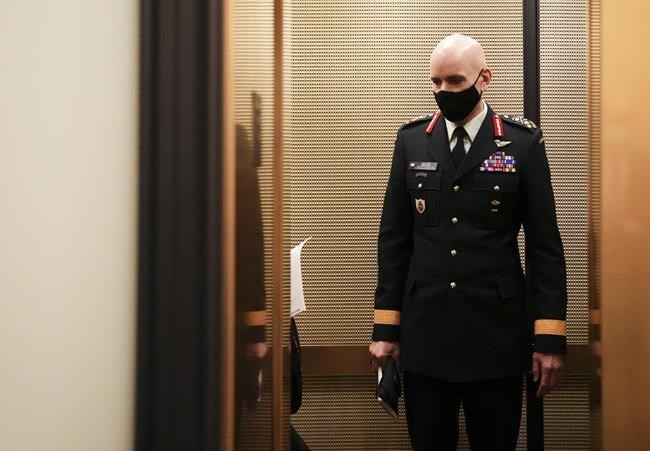OTTAWA ŌĆö Prime Minister Justin Trudeau is hinting that new investments are coming for sa╣·╝╩┤½├ĮŌĆÖs Arctic as tensions with Russia, and MoscowŌĆÖs unpredictability, incite new fears of a potential attack from the north.
Yet the nature and scope of any coming investments remain uncertain, with some emphasizing the importance of non-military spending and sa╣·╝╩┤½├ĮŌĆÖs top military commander pouring cold water on the idea of permanently positioning troops in the region.
The Liberal government is set to release its latest federal budget on Thursday, and is under pressure from the NATO military alliance and others to increase spending on sa╣·╝╩┤½├ĮŌĆÖs military following RussiaŌĆÖs invasion of Ukraine.
The six-week-old invasion has killed thousands of Ukrainians and Russians and dealt a significant blow to global security, escalating fears of a broader conflict as Moscow has engaged in nuclear sabre-rattling over the WestŌĆÖs support for Kyiv.
The invasion motivated Ottawa to move ahead with Washington on long-overdue plans to modernize the North American Aerospace Defence Command, the now-obsolete system responsible for detecting and identifying attacks on the continent.
Asked Tuesday about the threat of a Russian attack, Trudeau accused the Kremlin of ŌĆ£seeking to disrupt and cause chaos in the world.ŌĆØ
ŌĆ£We are continuing to stand strong in our sovereignty and our defence of the Arctic,ŌĆØ he added. ŌĆ£Of course, with Norad modernization on the table, with increased investments in defence, the Arctic is an area we're going to look closely.ŌĆØ
He didnŌĆÖt offer further details, but the comments came one day after Trudeau and Defence Minister Anita Anand spoke with the premiers of sa╣·╝╩┤½├ĮŌĆÖs three territories to discuss Arctic sovereignty and security.
ŌĆ£The premiers outlined their concerns about the ongoing Russian aggression in Ukraine and the risks it can pose to Arctic sovereignty,ŌĆØ read a summary of the conversation provided by the Prime MinisterŌĆÖs Office.
The summary also said the premiers ŌĆ£outlined the importance of building healthy communities and strong infrastructure in asserting sovereignty in the North,ŌĆØ adding the group discussed funding for health care, housing and climate change.
Northwest Territories Premier Caroline Cochrane said in a statement that her priorities are critical infrastructure, telecommunications such as broadband internet, and energy.
ŌĆ£Northern security is not just about robust military presence,ŌĆØ she said. ŌĆØItŌĆÖs also about building strong, resilient communities through significant investment in critical infrastructure like roads, telecommunications and energy.ŌĆØ
Stephane Roussel, an expert on Arctic security at the National School of Public Administration in Quebec, says there are clear gaps in sa╣·╝╩┤½├ĮŌĆÖs northern defences that federal investments in infrastructure and communications can help address.
ŌĆ£Yes, there's a security or defence usefulness,ŌĆØ he said. ŌĆ£But I think the idea is much more about developing these regions and connecting these regions with the rest of the country.ŌĆØ
Russia in the years before its invasion of Ukraine had started to rebuild and expand its military facilities across the polar region amid an anticipated Arctic resource rush. It also developed long-range weapons capable of hitting North America from afar.
Chief of the defence staff Gen. Wayne Eyre took note of those new weapons during an appearance before the Senate defence committee on Monday, where Anand promised to bring forward ŌĆ£robustŌĆØ new investments in Norad in the coming months.
But while Eyre also spoke of the need for more infrastructure, he said there is ŌĆ£no wayŌĆØ sa╣·╝╩┤½├Į can match Russia's large military footprint in the Arctic. He also spoke against the idea of permanently positioning large numbers of troops in the Far North.
The Canadian Armed Forces commander instead emphasized the importance of having ŌĆ£sets of austere infrastructureŌĆØ needed to deploy troops from the south as required to respond ŌĆ£given the situation at hand.ŌĆØ
ŌĆ£Whether it's additional forward operating locations for our jets that are part of Norad, whether it's projecting search-and-rescue capabilities based on certain events, whether it's projecting additional land forces to deal with climate change,ŌĆØ he said.
University of Calgary professor Rob Huebert said the reality is that Ottawa has struggled to build the military infrastructure it has already promised in the Arctic, such as a promised runway extension in Inuvik and a deepwater jetty at Nanisivik.
At the same time, he expressed concern that the threat posed by Russia isnŌĆÖt being taken as seriously as it should be.
ŌĆ£There is a little bit of naivety to think just because it's never happened, because it's so horrible, it never will,ŌĆØ he said of nuclear war. ŌĆ£That's a fallacy to simply say: ŌĆśWe haven't had nuclear war to this point, therefore we will not have it going into the future.ŌĆÖŌĆØ
This report by The Canadian Press was first published Apr. 5, 2022.
Lee Berthiaume, The Canadian Press



